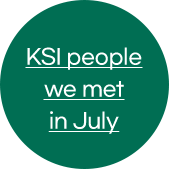
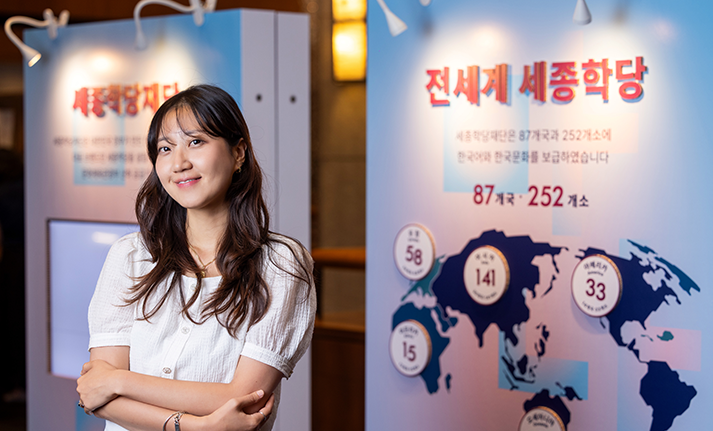
“Good classes ultimately come from good teachers.” Meeting with Teacher Lee Bo-hyun,
Winner of the KSIF President’s Award
at the 2025 World Korean Educator
Conference Outstanding Teacher Contest
Since the fall of 2024, Teacher Lee Bo-hyun has been serving as both a Korean language teacher and an administrative staff member at KSI Luxembourg, where she has planned and conducted Korean culture classes tailored to multilingual environments by leveraging AI technology. In this interview, we spoke with her about the background and strategies behind her award-winning Korean Film Culture Class—which earned her the KSIF President’s Award (Excellence Award) in the Outstanding Teacher Contest—as well as her philosophy as a Korean language educator and her future goals.
Hello, Teacher Lee Bo-hyun! To begin, could you please introduce yourself to the readers of Monthly Knock Knock?
Hello. I’m Lee Bo-hyun, and I teach Korean at KSI Luxembourg. I majored in film at university and, after graduation, worked in the cultural content industry as an editor and broadcast writer. Then, wanting to learn a third language, I went to France in 2022 for language study. There, I unexpectedly realized that I have a very keen sensitivity toward the Korean language. Although I learned new languages relatively quickly, I came to feel that my sense and understanding of Korean were even deeper, which naturally led me to develop an interest in Korean language education.
I first began teaching Korean by giving lessons to French friends around me. Gradually, I became convinced that this was a field well suited for me, and in 2023, I completed the Korean Language Teacher Training Program (DU) at Bordeaux Montaigne University, officially starting my teaching career. I then continued teaching Korean in places such as Paris, France, and London, UK, before settling in Luxembourg in the fall of 2024, where I have been working at KSI Luxembourg as both a teacher and an administrative staff member.
Currently, I am in charge of a range of regular classes from beginner to intermediate levels, and together with the head of the institute, I also plan and operate various types of cultural classes, including the Korean Literature Club, Korean Film Club, and Korean Chatting Club.
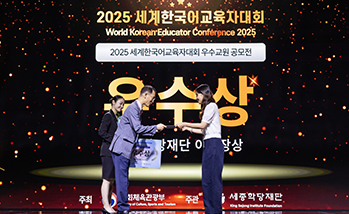
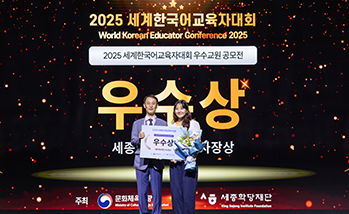
Teacher Lee Bo-hyun receiving the KSIF President’s Award at the opening ceremony
of the 2025 World Korean Educator Conference
Congratulations on receiving the KSIF President’s Award in the Outstanding Teacher Contest at the 2025 World Korean Educator Conference. Please tell us about your award-winning program, Korean Becomes a Diplomatic Language, which you also shared in your best practices presentation on the first day of the conference.
The program that received the award is the Korean Film Culture Class, which has now been running for its second semester at KSI Luxembourg. Luxembourg is a quintessentially multilingual and multicultural society—62% of learners are fluent in four or more languages—so they are highly accustomed to language learning. For that reason, I felt it would be difficult to spark learner engagement through classes focused solely on “information delivery.” I therefore designed the class to reflect the unique characteristics of Luxembourg, placing at its core the philosophy that Korean should function not merely as a “foreign language” but as a “diplomatic language” that connects learners from diverse linguistic backgrounds and fosters a sense of community. Based on this philosophy, I established the following three core strategies:
First, “Theme-Based Selection of Korean Films.” Each semester, I set a clear theme—such as “10-Million-Viewer Films” or “Baeksang Arts Awards Best Director Winners”—and explored the context and symbolism of works that embody the emotional structure, history, and cultural codes of Korean society, helping learners deepen their “cultural thinking.”
Second, “Language-Specific Group Discussions.” After watching the films, learners hold group discussions in the language they are most comfortable with—English, French, Korean, etc. Each group is joined by a native Korean-speaking facilitator who can answer questions and naturally guide the discussion toward Korean. I aimed to create a structure where even beginner learners would not feel excluded or face language barriers.
Third, “Active Use of AI Tools.” To lower the speaking barrier for beginners, I introduced Flitto (a real-time interpretation app), enabling learners to speak in their familiar language and have it interpreted into Korean. They then capture or write down the results for review materials. Before class, I used Release AI to transcribe the lines of Korean videos without subtitles, and based on that transcription, I employed AI tools such as ChatGPT, Claude, and Gemini to create vocabulary and grammar resources tailored to each proficiency level in the form of worksheets. This allowed learning to continue beyond the classroom.
The main reason I entered the contest was because I did not want this class to remain a unique case exclusive to KSI Luxembourg. I believe it can serve as a class model that, while adapted and adjusted to fit different regions and environments, could be applied in KSIs worldwide. That is why, in my presentation, I aimed to share not only the philosophy of the class but also the thought process behind its inception and the concrete steps taken to bring it to life.
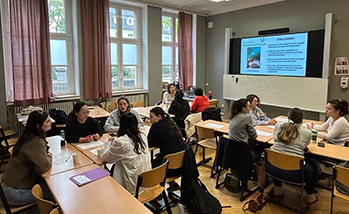 Learners at KSI Luxembourg participating
Learners at KSI Luxembourg participating
in the Korean Film Culture Class 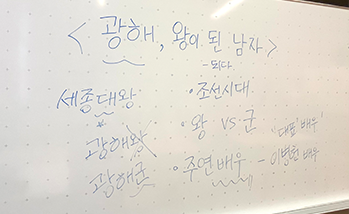 A blackboard with background information and
A blackboard with background information and
key vocabulary written down to aid
in understanding Korean films
How did you feel when you heard the news of your award?
I was truly delighted. The first people who came to mind were the head of the institute and my fellow teachers who helped create this class with me, the many colleagues at KSI, who have always been a source of support, and especially our learners who participated so enthusiastically in the class. They were the first ones I shared the news with, and everyone sincerely rejoiced as if it were their own accomplishment.
I did not start this class with the intention of achieving some special result. Rather, it was something that naturally took shape after I came to understand the linguistic sensibilities and backgrounds of the learners I met in Luxembourg, where I currently live, and asked myself, “What can I do here and now?” Because I had people who supported me and worked alongside me, those reflections and efforts were able to move forward powerfully in the right direction.
This opportunity is all the more meaningful because it has allowed me to share more widely the story of a Korean language class created together with multilingual learners in the small but unique setting of Luxembourg. I am also grateful to the KSIF for giving me this award.
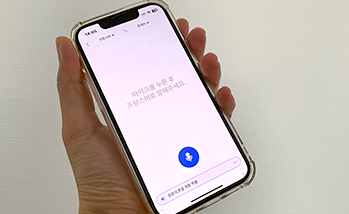 Running the real-time interpretation app Flitto
Running the real-time interpretation app Flitto 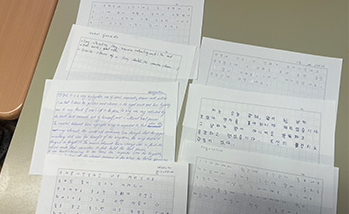 Film reviews submitted by learners
Film reviews submitted by learners
after watching a Korean movie
Through the Korean Film Culture Class—which involves watching Korean films, engaging in multilingual discussions about them, and even using AI interpretation apps—what positive changes have you seen at KSI Luxembourg?
The most significant change I have noticed through this class is that Korean is actually functioning like a “diplomatic language” within Luxembourg. In Luxembourg’s multilingual society, where French, German, Luxembourgish, English, and other languages coexist, I found that Korean was not being relegated to a “minority language.” Instead, it was emerging as a “central language” that learners actively choose and use to connect with one another.
As the class progressed, the bonds among learners grew much stronger. Many students who attended the sessions expressed, “I want to speak, too” or “I’d like to keep participating,” which in many cases led to their registering for regular courses. Some learners even created a logo for the class, volunteered to give summary presentations, or helped with promotions—growing into members of the class operations team, or “assistant organizers.” At some point, it became natural for learners to bring homemade bread or share drinks, turning the class into not just a place to learn a language, but the “center of a community” where people connect.
Furthermore, the class has expanded beyond the KSI itself, naturally fostering connections with the local community. In collaboration with the local cinema, Cinémathèque, we organized on-site experiential classes where students could watch Korean films together and then hold discussions in Korean right there at the venue. We have also hosted joint film gatherings with clubs from the University of Luxembourg and discussed operating the Korean film section at an international film festival. Through such initiatives, KSI is establishing itself as a “Korean culture platform” embedded within the local community.
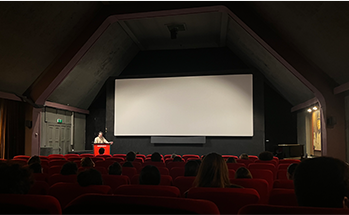 On-site experiential class held
On-site experiential class held
at Cinémathèque in Luxembourg 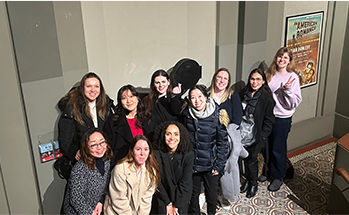 Commemorative photo taken with KSI learners
Commemorative photo taken with KSI learners
after the on-site experiential class
What is the greatest reward you have gained from working as a Korean language teacher at KSI?
What I have felt most strongly while teaching at KSI is that none of the experiences I have accumulated throughout my life—my past, present, and the time leading into the future—have been in vain. Everything I went through and built up during my university, graduate school, and professional career is now naturally serving as a meaningful asset in every moment I teach Korean. Even the ordinary experiences that once passed by without much thought have now become invaluable in helping me convey emotions and contexts beyond the language itself to my students.
The fact that I can share not only grammar and vocabulary but also the sensibilities and cultural context I have accumulated as a Korean is something I find both new and deeply gratifying every time. Knowing that my authentic self can be meaningful to someone else feels like “self-realization through work” and “a fulfillment in life” that everyone hopes to achieve at least once.
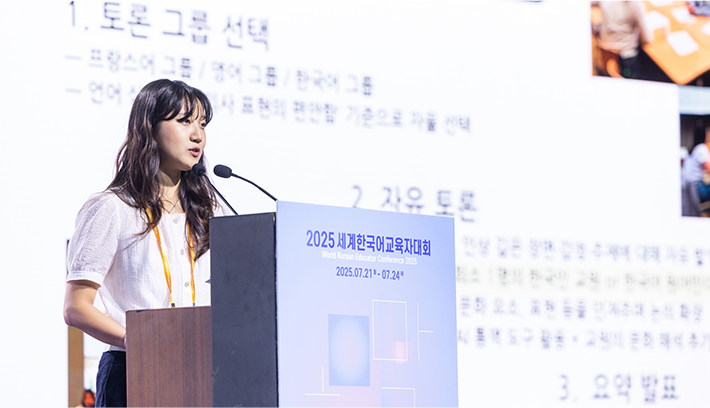 Teacher Lee Bo-hyun presenting her award-winning best practices
Teacher Lee Bo-hyun presenting her award-winning best practices
at the opening ceremony of the 2025 World Korean Educator Conference
Lastly, could you share any goals or plans you hope to achieve in relation to Korean language education?
One of my French students, whom I had taught from the basics of Hangeul, grew to the point where, in 2024, they interviewed a BTS member in Korean at the Paris Olympics, and in 2025, interviewed Director Bong Joon-ho and several other Korean film directors and actors at the Cannes Film Festival. Seeing this growth gave me immense pride. Watching a student ask questions and converse more naturally as their Korean skills improved filled me with joy and satisfaction, while also impressing upon me a deep sense of responsibility to further strengthen my own knowledge and expertise as a Korean language educator.
That is why the goal I value most is to continuously develop my professional expertise as a teacher. While it is often said these days that we live in an “era where sincerity resonates,” I believe sincerity alone—expressed only through a warm attitude—is not enough. For sincerity to be truly conveyed, it must be supported by solid skills and expertise. I believe that good classes ultimately come from good teachers, so my top priority is to become a teacher with strong professional competence.
Based on this interest and capability, I would like to actively participate in developing educational materials using digital tools and AI-based platforms. Furthermore, if I could plan and produce teaching materials and aids that are genuinely needed in the field, and thereby help more teachers independently design their own classes, I would consider that an immensely rewarding accomplishment.